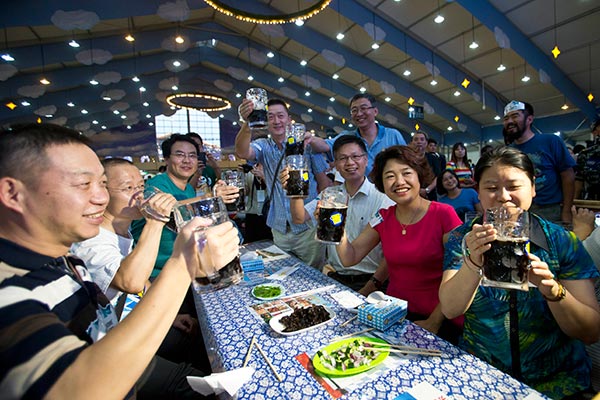Crafting beer with Chinese characteristics
By EMMA GONZALEZ (China Daily) Updated: 2016-02-17 07:24
 |
|
Beer sales in China are expected to increase to 49 billion liters in 2016, boosted by premium brands.[ZHAO BING / FOR CHINA DAILY] |
Brewery officials complain that there is still a very limited selection of locally produced grains and hops available for nonindustrial brewers.
"The hops we are using are almost 100 percent from the United States. Meanwhile, grains come from Europe and New Zealand," Jurinka added.
Still, China's agriculture is undergoing some important changes that could benefit local craft brewers.
"We have been contacted by some nongovernmental organizations that are helping farmers repurpose land for high-quality grains. So, there is something happening in that respect," Jurinka said.
The brewery is using domestic ingredients such as herbal tea, spices from Guangzhou and honey from Yunnan province to give a local taste to their brews.
"The craft revolution that everyone seems to be talking about is not only about the boom of high-alcohol and highly flavored beers," Jurinka said. "The revolution is all about localizing a global product."
Great Leap, one of the leading establishments in Beijing's craft scene, puts a special emphasis on sourcing local products whenever possible for its beers. The brewery signed an agreement with China National Cereals, Oils and Foodstuffs Corp, the country's largest food association.
"COFCO supplies 100 percent of our base malts. For hops, we are also using Qingdao flower, which is the closest thing you can get to an indigenous Chinese hop here," founder Carl Setzer said.
Setzer, from the United States, opened Great Leap Brewing in 2010 near Houhai and in 2013, in order to meet increasing demand, inaugurated his largest brewpub in the capital's trendy Sanlitun area with an investment of $1.1 million.
Great Leap Brewing now has the capacity to produce 550,000 million liters and expects 2016 to be its biggest year ever thanks to adding a second location.
Setzer sees the increasing popularity of microbrewing culture in China as a direct consequence of the ongoing economic and social changes in the country.
"Craft brewing is an example of where China wants its economy to go in the future. They don't want mass produced and low-margin goods. They now look for something that is high quality and representative of the new China," he said.
- Internet companies gift red envelopes to employees
- Record credit demand not long-term trend: UBS
- China approves 21 fixed-asset investment projects
- Boeing, Okay Airways announce commitment for 12 Boeing 737 jets
- Development body to give $61b funds for local infrastructure
- TPP has slight negative impact on China: US think tank
- China, Russia simplify direct road transport formalities
- Ku6 Media receives Nasdaq delisting notification
















